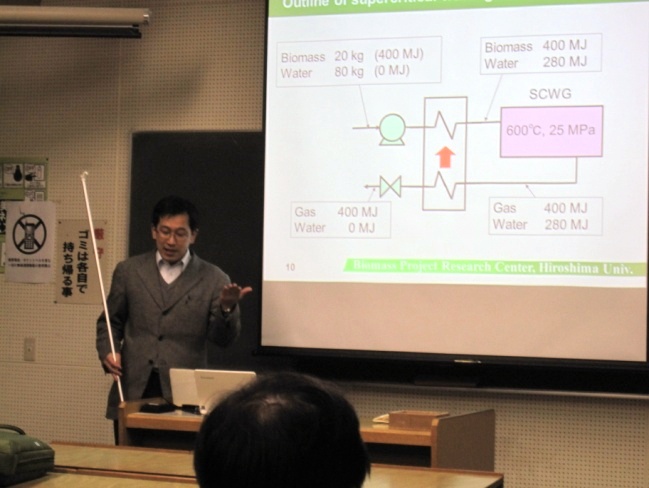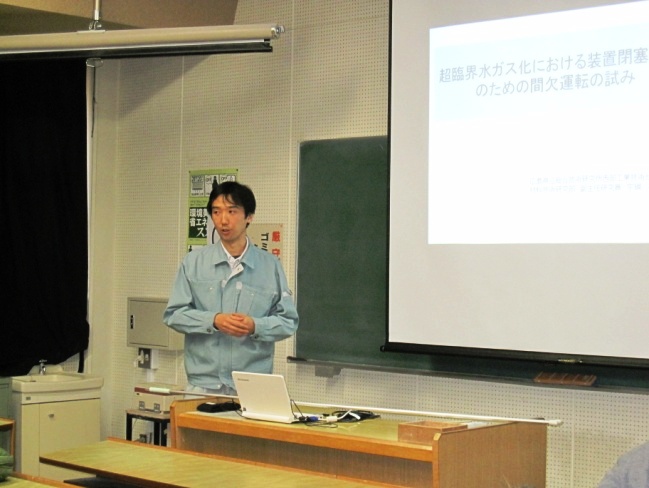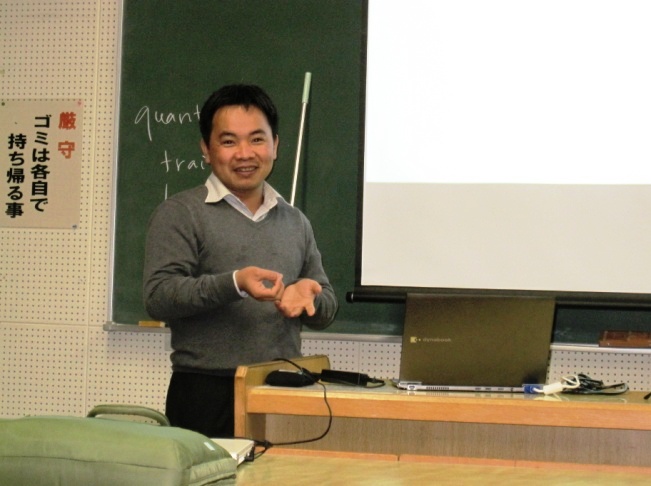|
On Apr 24, 2013, the 8th Biomass Evening Seminar was held at Graduate School of Engineering, Hiroshima University.
Biomass Project Research Center, Hiroshima University, and HOSTY Association are co-organizing the Hiroshima University Biomass Evening Seminar. This seminar covers topics from the fundamentals of biomass to the latest information so that it can contribute the activities on biomass in this district.
Yukihiko MATSUMURA
Professor, Faculty of Engineering
|
|
"Attempt of Supercritical Water Gasification Staged at Intervals to Prevent Reactor Plugging"
Hiroto MUNETSUNA
Vice chief researcher,
Department of material technology research, West Region Industrial Research Center,
Hiroshima Prefectural Technology Research Institute
 We have researched supercritical water gasification (SCWG) of food waste. It is difficult to operate the apparatus continuously because the reactor is often plugged, and to solve the problem of reactor plugging is important for practical use of SCWG. To circumvent the problem of reactor plugging in SCWG, we proposed an SCWG process operated at intervals with a continuous-flow system (10 kg/d) configured to feed water and feedstock in alternate steps. Hydrogen fermentation residues of soybean fiber and restaurant food waste (SFHFR and RWHFR, respectively) were employed as feedstock, and fine activated carbon was used as catalyst. Gasification characteristics of feedstock and energy balance in interval SCWG process were investigated. We have researched supercritical water gasification (SCWG) of food waste. It is difficult to operate the apparatus continuously because the reactor is often plugged, and to solve the problem of reactor plugging is important for practical use of SCWG. To circumvent the problem of reactor plugging in SCWG, we proposed an SCWG process operated at intervals with a continuous-flow system (10 kg/d) configured to feed water and feedstock in alternate steps. Hydrogen fermentation residues of soybean fiber and restaurant food waste (SFHFR and RWHFR, respectively) were employed as feedstock, and fine activated carbon was used as catalyst. Gasification characteristics of feedstock and energy balance in interval SCWG process were investigated.
|
“Sweet sorghum as an alternative crop for bioethanol production”
Tran Dang Xuan
Associate professor, Graduate School for International Development at Cooperation
 The production of bioethanol from crops such as maize and cassava has raised social controversies and caused problems such as shortage of material supply and waste treatment. Sweet sorghum appears as a potential alternative crop for bioethanol production. In our experimental trials conducted in Japan, Vietnam, and China, many hybrid lines of sorghum showed promising production (>140 tons/ha) and high brix content (14-16). Several cultivars may provide potential production of bioethanol up to 9000 L/ha. Sweet sorghum adapts well with many of soils and climates and strong tolerance to pests, diseases, weeds and drought. Different models of cropping systems fit with income of farmers in developing have been examined. The cultivation of sweet sorghum is estimated to have higher income to farmers as compared to that of other common crops such as rice. Sweet sorghum can also be exploited as green manure, cattle fed, and source for soil detoxification from heavy toxic chemicals. The production of bioethanol from crops such as maize and cassava has raised social controversies and caused problems such as shortage of material supply and waste treatment. Sweet sorghum appears as a potential alternative crop for bioethanol production. In our experimental trials conducted in Japan, Vietnam, and China, many hybrid lines of sorghum showed promising production (>140 tons/ha) and high brix content (14-16). Several cultivars may provide potential production of bioethanol up to 9000 L/ha. Sweet sorghum adapts well with many of soils and climates and strong tolerance to pests, diseases, weeds and drought. Different models of cropping systems fit with income of farmers in developing have been examined. The cultivation of sweet sorghum is estimated to have higher income to farmers as compared to that of other common crops such as rice. Sweet sorghum can also be exploited as green manure, cattle fed, and source for soil detoxification from heavy toxic chemicals.
|
[Inquiries about this article]
Thermal Energy Laboratory, Graduate School of Engineering
Y.NAKASHIMA
Mail: y4naka [AT] hiroshima-u.ac.jp
(Please replace [AT] with @)


 Home
Home
 We have researched supercritical water gasification (SCWG) of food waste. It is difficult to operate the apparatus continuously because the reactor is often plugged, and to solve the problem of reactor plugging is important for practical use of SCWG. To circumvent the problem of reactor plugging in SCWG, we proposed an SCWG process operated at intervals with a continuous-flow system (10 kg/d) configured to feed water and feedstock in alternate steps. Hydrogen fermentation residues of soybean fiber and restaurant food waste (SFHFR and RWHFR, respectively) were employed as feedstock, and fine activated carbon was used as catalyst. Gasification characteristics of feedstock and energy balance in interval SCWG process were investigated.
We have researched supercritical water gasification (SCWG) of food waste. It is difficult to operate the apparatus continuously because the reactor is often plugged, and to solve the problem of reactor plugging is important for practical use of SCWG. To circumvent the problem of reactor plugging in SCWG, we proposed an SCWG process operated at intervals with a continuous-flow system (10 kg/d) configured to feed water and feedstock in alternate steps. Hydrogen fermentation residues of soybean fiber and restaurant food waste (SFHFR and RWHFR, respectively) were employed as feedstock, and fine activated carbon was used as catalyst. Gasification characteristics of feedstock and energy balance in interval SCWG process were investigated. The production of bioethanol from crops such as maize and cassava has raised social controversies and caused problems such as shortage of material supply and waste treatment. Sweet sorghum appears as a potential alternative crop for bioethanol production. In our experimental trials conducted in Japan, Vietnam, and China, many hybrid lines of sorghum showed promising production (>140 tons/ha) and high brix content (14-16). Several cultivars may provide potential production of bioethanol up to 9000 L/ha. Sweet sorghum adapts well with many of soils and climates and strong tolerance to pests, diseases, weeds and drought. Different models of cropping systems fit with income of farmers in developing have been examined. The cultivation of sweet sorghum is estimated to have higher income to farmers as compared to that of other common crops such as rice. Sweet sorghum can also be exploited as green manure, cattle fed, and source for soil detoxification from heavy toxic chemicals.
The production of bioethanol from crops such as maize and cassava has raised social controversies and caused problems such as shortage of material supply and waste treatment. Sweet sorghum appears as a potential alternative crop for bioethanol production. In our experimental trials conducted in Japan, Vietnam, and China, many hybrid lines of sorghum showed promising production (>140 tons/ha) and high brix content (14-16). Several cultivars may provide potential production of bioethanol up to 9000 L/ha. Sweet sorghum adapts well with many of soils and climates and strong tolerance to pests, diseases, weeds and drought. Different models of cropping systems fit with income of farmers in developing have been examined. The cultivation of sweet sorghum is estimated to have higher income to farmers as compared to that of other common crops such as rice. Sweet sorghum can also be exploited as green manure, cattle fed, and source for soil detoxification from heavy toxic chemicals.